#Orestes Pursued by the Furies
Text

Orestes Pursued By The Furies (1862) by William Bouguereau.
#art#aesthetic#painting#artwork#art history#dark academia#19th century#mythology#greek mythology#dark aesthetic#romantic academia#chaotic academia#dark art#romanticism#greek gods#paintings#oil painting#classical art#orestes pursued by the furies#william bouguereau
1K notes
·
View notes
Text
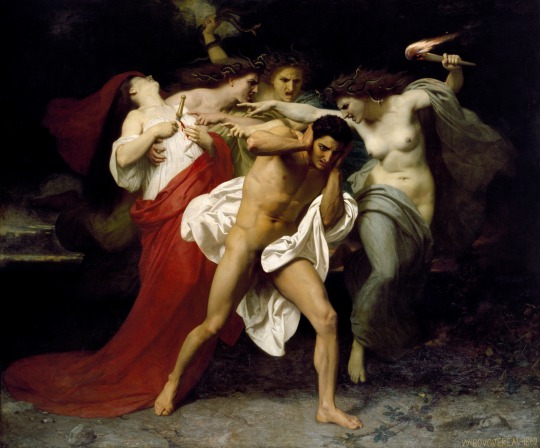
Orestes Pursued by the Furies (1862) by William-Adolphe Bouguereau (1825–1905)
#art#french#william adolphe bouguereau#orestes pursued by the furies#the remorse of orestes#people#men#women#mythology#greek mythology#clytemnestra#orestes#the furies#nudity#exterior#19th century#1800s#late 1800s#oil on canvas#chrysler museum of art
44 notes
·
View notes
Text
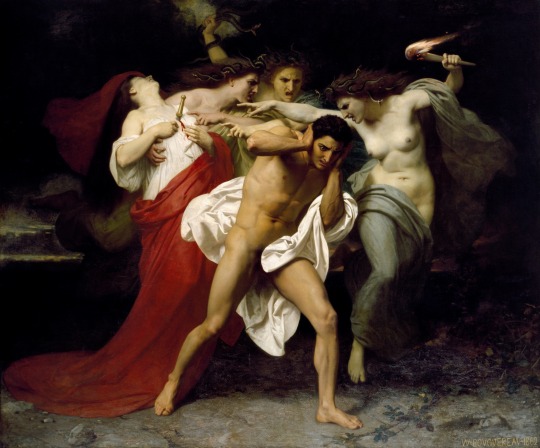
Orestes Pursued by the Furies (1862 / oil on canvas) | William-Adolphe Bouguereau
#art#painting#19th century#oil painting#neoclassicism#french art#greek mythology#orestes pursued by the furies#the remorse of orestes#william adolphe bouguereau#orestes#aesthetic#art aesthetic
39 notes
·
View notes
Photo
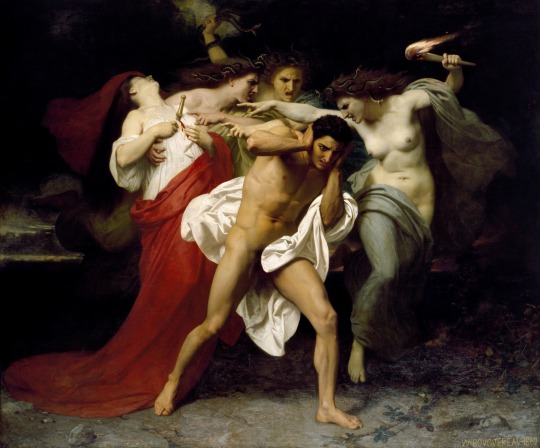
Painting
Orestes Pursued by the Furies
William Bouguereau
1862
15 notes
·
View notes
Text
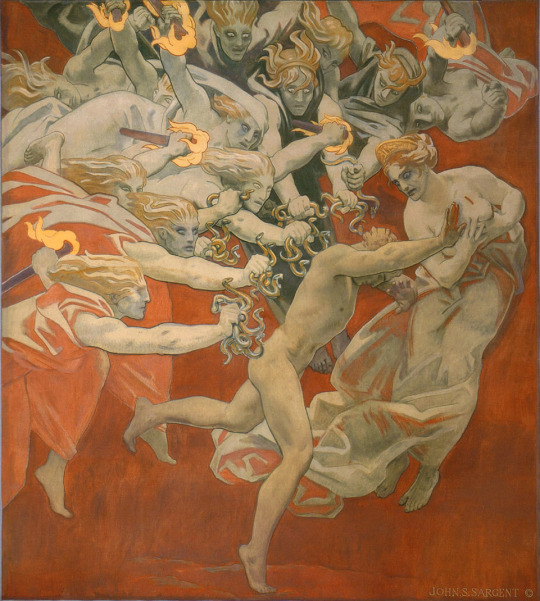
Orestes Pursued by the Furies by John Singer Sargent
#orestes#furies#art#john singer sargent#john sargent#greek mythology#ancient greek#ancient greece#tragedy#tragedies#classical antiquity#antiquity#europe#european#mythology#mythological
2K notes
·
View notes
Text
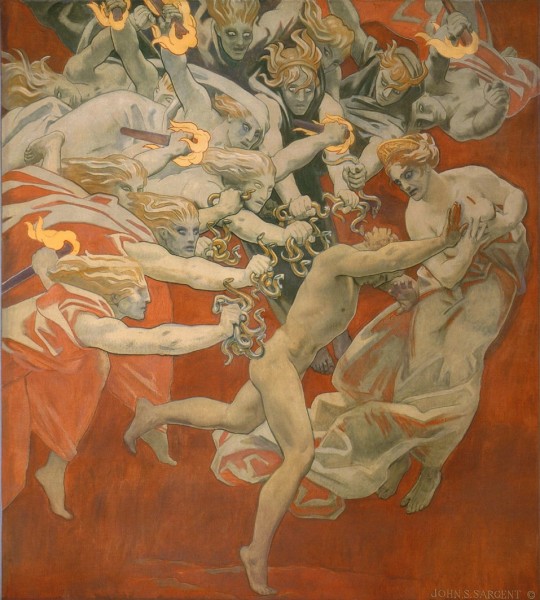
Orestes Pursued by the Furies by John Singer Sargent (1921)
#john singer sargent#art#paintings#fine art#1920s#1920s art#painting#american art#american artist#mythology#greek mythology#orestes#the furies#erinyes#classic art
2K notes
·
View notes
Text
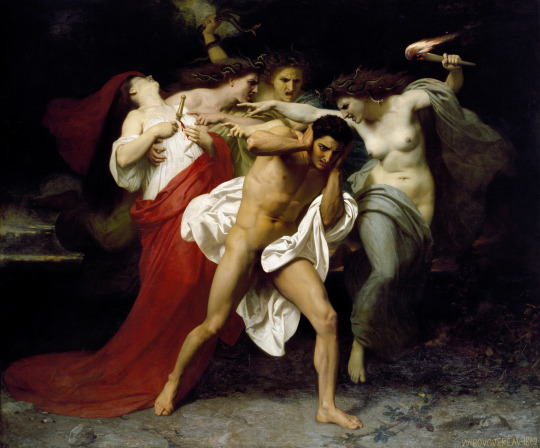
Orestes Pursued By The Furies, 1862
William Bouguereau
#William Bouguereau#realism#academicism#art#painting#art history#mythology#greek mythology#The Furies#deities#orestes#1860s
920 notes
·
View notes
Note
How do you think Baldwin would react if reader got into a heated argument with someone to the point it was getting really bad?
King Baldwin x reader - Defending your honor
A/N: eheheh I see you guys really yearn to see Baldwin losing his temper, huh?
I can't lie I've been thinking of a similar scenario too lately, I guess you can't help it when he's so perfect in every way, shape or form🙈
Painting is "Orestes pursued by the Furies" by Adolphe William Bouguereau btw :))
Warning: mention of disrespect towards reader but nothing is actually specified!
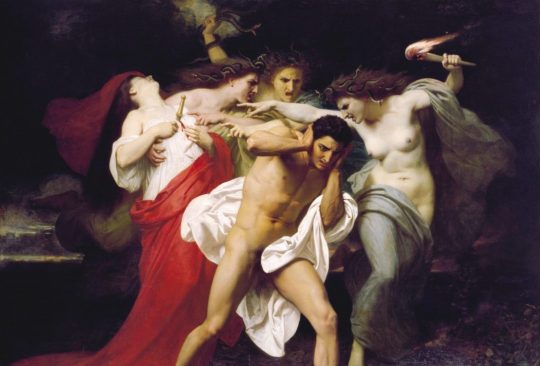
He's intervening right away
He's got the wits to shut anyone's mouth, and he isn't afraid to embarrass whoever it is that is disrespecting his perfect wife
Whether it's a snide remark, a direct insult or an order for them to shut their mouths if they don't want any consequences for their outrageous behavior
If it got really really bad, like you said, I can actually see him lose his temper
Maybe the person arguing with you took it too far by directly insulting or belittling you, and that would cross the line for him
He'd jump up from his seat, pushing his chair down to the floor in the act, while looking dead in the eye unfortunate fool who dared to disrespect her highness the queen of Jerusalem
"If you dare to speak to your queen in such a tone again, your tongue will be your next meal!"
Everyone is shocked. You are shocked, his knights are shocked, your own rival is shocked (and mostly terrified)
Baldwin is a bit surprised with his own rush of wrath, too, but he doesn't give any hint of his surprise
While his servants waste no time putting his chair back in place, he keeps standing menacingly, eyeing the culprit of such blasphemy against his wife
After a few apologies from the person, Baldwin would hiss through gritted teeth: "It is the queen you have to apologize to, you miserable"
And that tone somehow manages to be even more threatening than his previous yelling, maybe because everyone knew that in that moment he was in his right state of mind, and that he was able to make whatever decision he wanted to punish the man before him, without ever regretting it
He wouldn't calm down until you give him a sign that everything's alright, then he'd drop the subject but it would still cling to him for the rest of the day
He loves you more than words can express, and he will never, ever be able to just stand silently there and observe someone disrespect you like that
#kingdom of heaven#king baldwin x reader#headcanons#king baldwin x you#king baldwin iv#the leper king#anon ask#ask me anything
122 notes
·
View notes
Text
Wait...wait...I've just realised something about The Sleeper.
So obviously there's the whole joke on the name Wake (as Ortus himself accidentally points out: "Perhaps a better name would have been.… the Waker") but...I think there's also (yet another) classical reference here.
In Aeschylus' Eumenides, Orestes is pursued by the Furies for the murder of his mother, Clytemnestra. The Furies in question are Tisiphone (“avenging murder”), Megaera (“grudging”), and...oh yeah...Alecto (“unceasing”).
To give Orestes a respite, the god Apollo puts the Furies to sleep, but they are woken by the ghost of Clytemnestra.
Now usually when ghosts turn up in ancient Greek plays/poems/etc it's to complain about not having been buried properly. Clytemnestra turns up asking for vengeance. (The Furies then track Orestes by the scent of his mother's blood on him, and then it all goes a bit Judge Judy with the goddess Athena, but that's getting past Clytemnestra...)
Anyway, Clytemnestra's ghost turns up and says to the Furies: "Sleep on! Aha! Yet what need is there of sleepers?"
So apparently the River bubble is just niche ancient Greek ghost references all the way down...
411 notes
·
View notes
Text
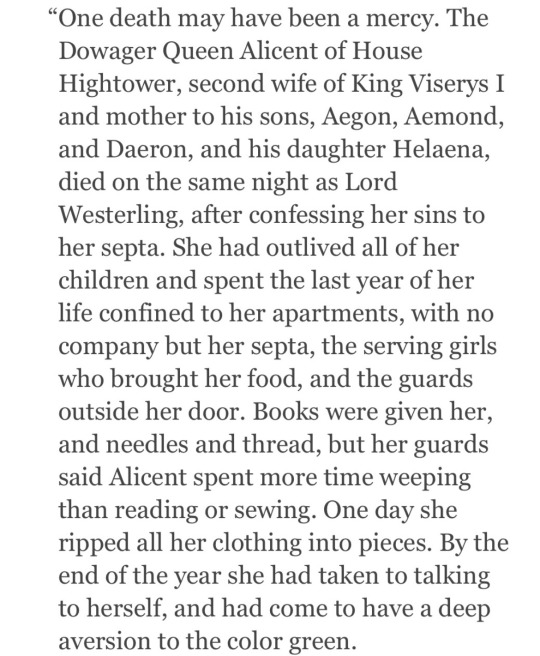
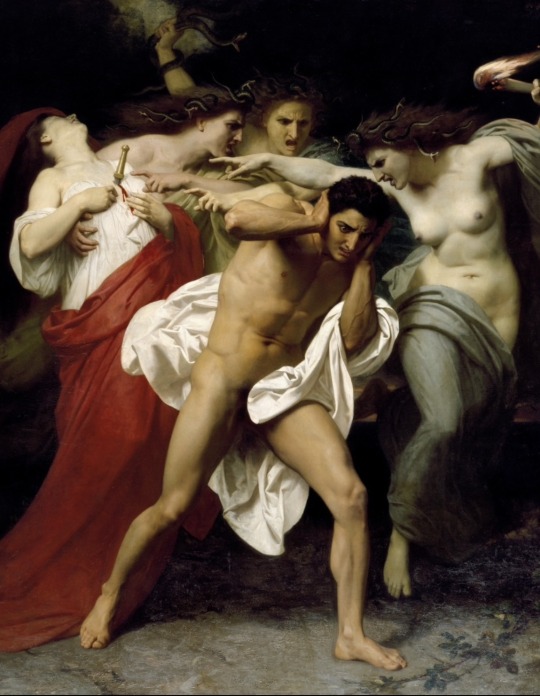
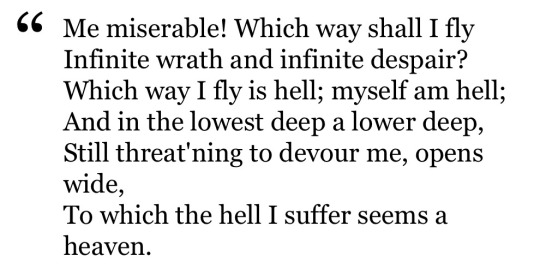
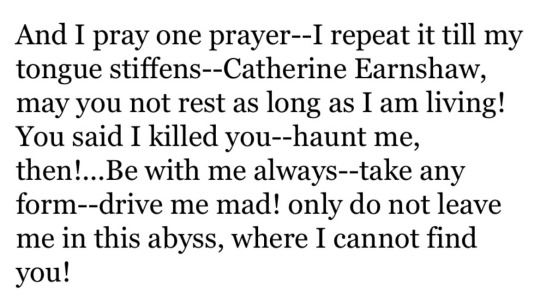
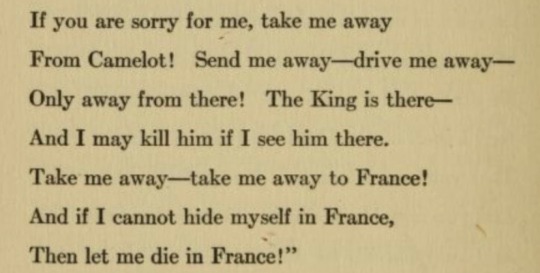


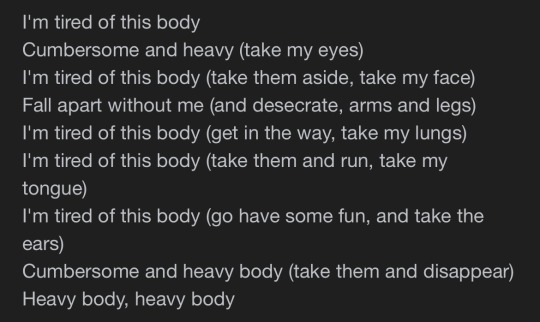

Alicent in Maegor’s Holdfast
George R.R. Martin Fire & Blood / William-Adolphe Bouguereau Orestes Pursued by the Furies / John Milton Paradise Lost / Emily Brontë Wuthering Heights / E.A. Robinson Lancelot / Olivia Cooke in House of the Dragon / Sheridan Le Fanu Carmilla / Mother Mother Body / Gillian Flynn Sharp Objects
#alicent my beloved#alicent hightower#house of the dragon#rhaenicent#hotd#rhaelicent#asoiaf#fire & blood#f&b#the greens#quotes
53 notes
·
View notes
Text
ALso for science ( visual arts )
37 notes
·
View notes
Photo
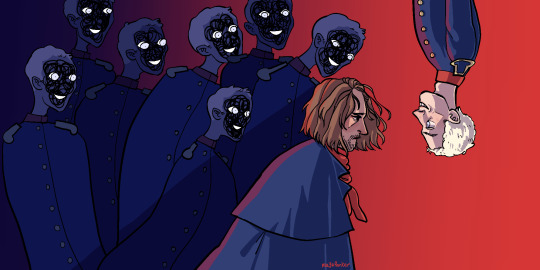
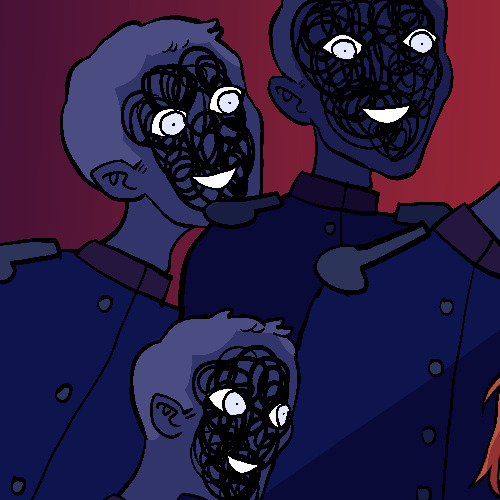
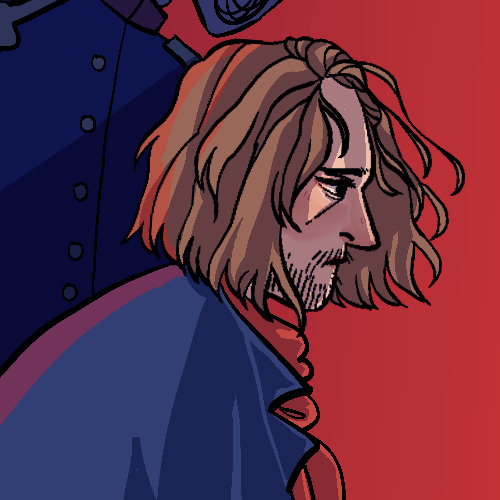
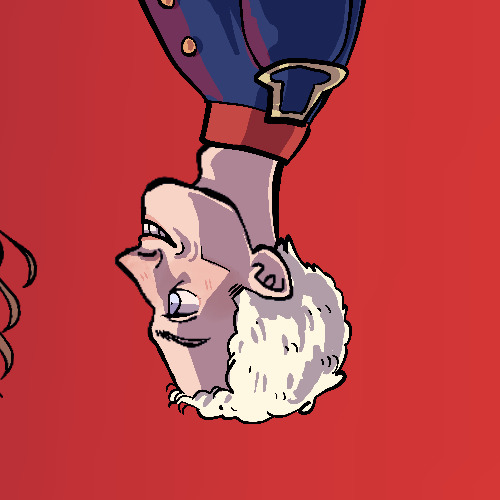
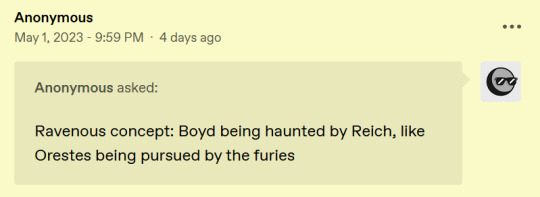
loved this idea so much i wanted to make it a proper image post. anon your mind
[id: an anonymous ask reading, “Ravenous concept: Boyd being haunted by Reich, like Orestes being pursued by the furies.” the image above is an illustration of this in shades of red and blue; reich hovers upside down in front of boyd, pale eyes wide and grinning with teeth. shadowy specters of reich with pale eyes and grinning mouths follow behind boyd. end id.]
87 notes
·
View notes
Photo
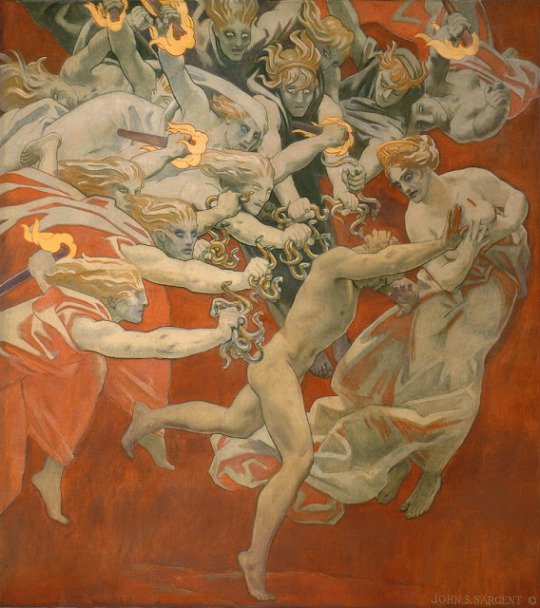
John Singer Sargent Orestes pursued by the furies 1920
282 notes
·
View notes
Note
You said that Apollo is the ultimate misogynist... But that was Aischylos' Eumenides's fault! In othr myths he supports women! Why you say he is the ultimate misogynist? I'm a woman, but also i like Apollo! Do't forget he and Artemis defended their mother from that giant! Apollo also prefered the FEMININE companion of the Muses...
That misogynism is Aischylos! Now everyone will insult Lord Apollo something he didn't said and contradicts with others actions in his myths!
I didn't? I merely pointed out that (at least in my experience) people seem far more willing to call Athena a misogynist for what she said in the Eumenides in comparison to Apollo whose claims are just as problematic™ if not more so.
And sure, he has good relationships with some women and doesn't let his mother get raped (not that any of this would inherently make him not a misogynist), but at the same time he also pursues unwilling women, commits rape and fights with other men over a woman instead of asking her which one she wants to be with.
As for people insulting Apollo... I mean, the Eumenides is, like, two millennia and a half old, so his reputation is probably quite safe even if some people dislike him (generally for reasons unrelated to this particular play). The ancient Greeks themselves didn't seem to take any issues with his portrayal in the Eumenides and to consider it out of character for him. It's perfectly normal for a mythological character to differ in some respects from one story to another, even to act in ways that contradict their actions in other sources; that is the nature of mythology. All of that aside, why does everyone keep assuming that a character in a literary text must wholeheartedly believe every word he/she says? Apollo is trying to defend Orestes against the Furies and it would be very easy to choose to believe that he is simply using whatever argument he thinks will be most effective in absolving Orestes of the crime of killing his mother. Wouldn't that be easier than railing against the long dead author?
11 notes
·
View notes
Text

Orestes Pursued by the Furies (Also known as The Remorse of Orestes)
by William-Adolphe Bouguereau
In the Iliad, the king of Argos, Agamemnon, sacrifices his daughter Iphigenia to Artemis to assure good sailing weather to travel to Troy and fight in the Trojan War. In Agamemnon, the first play of Aeschylus's Oresteia trilogy, Agamemnon's wife, Clytemnestra, and her lover, Aegisthus, murder Agamemnon upon his return home as revenge for sacrificing Iphigenia. In The Libation Bearers, the second play of the Orestia, Agamemnon's son Orestes returns home to take revenge on his mother for murdering his father. Orestes ultimately does murder his mother, and afterward is tormented and chased offstage by The Furies, beings who personify vengeance.
#orestes#the furies#art#william adolphe bouguereau#greek mythology#history#the iliad#homer#antiquity#ancient greece#mythology#mythological#europe#european#ancient greek#neoclassical#agamemnon#clytemnestra#greek#greece#classical#ancient world#ancient#tragedy#tragedies
326 notes
·
View notes
Text
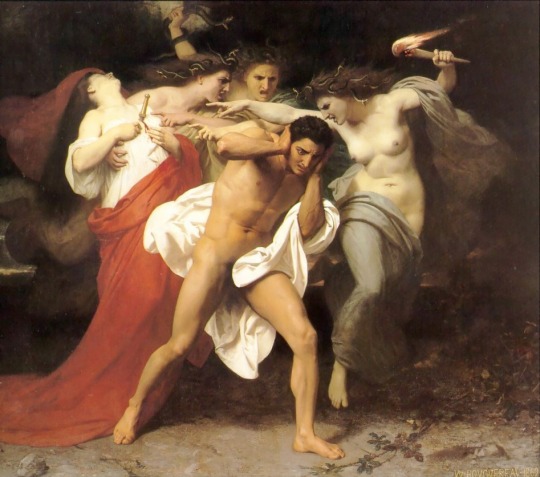
Orestes Pursued by the Furies by William-Adolphe Bouguereau (1862)
#william adolphe bouguereau#art#paintings#fine art#19th century#19th century art#academism#academicism#academic art#painting#french art#french artist#mythology#greek mythology#orestes#the furies#erinyes#classic art
1K notes
·
View notes